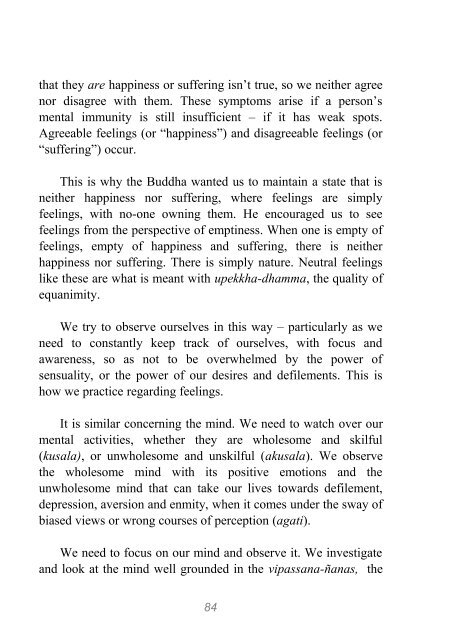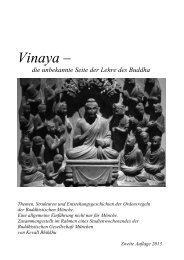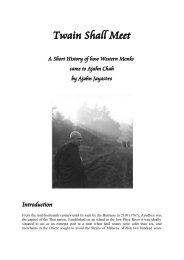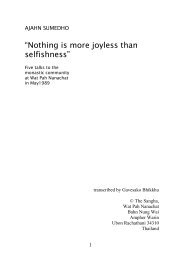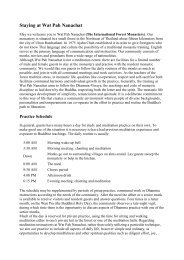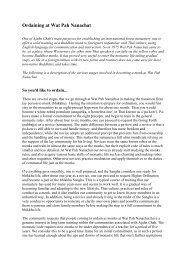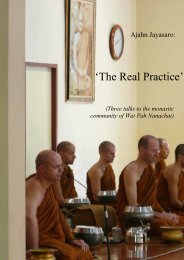Luang Por Liem: The Ways of the Peaceful - Wat Pah Nanachat
Luang Por Liem: The Ways of the Peaceful - Wat Pah Nanachat
Luang Por Liem: The Ways of the Peaceful - Wat Pah Nanachat
You also want an ePaper? Increase the reach of your titles
YUMPU automatically turns print PDFs into web optimized ePapers that Google loves.
that <strong>the</strong>y are happiness or suffering isn’t true, so we nei<strong>the</strong>r agree<br />
nor disagree with <strong>the</strong>m. <strong>The</strong>se symptoms arise if a person’s<br />
mental immunity is still insufficient – if it has weak spots.<br />
Agreeable feelings (or “happiness”) and disagreeable feelings (or<br />
“suffering”) occur.<br />
This is why <strong>the</strong> Buddha wanted us to maintain a state that is<br />
nei<strong>the</strong>r happiness nor suffering, where feelings are simply<br />
feelings, with no-one owning <strong>the</strong>m. He encouraged us to see<br />
feelings from <strong>the</strong> perspective <strong>of</strong> emptiness. When one is empty <strong>of</strong><br />
feelings, empty <strong>of</strong> happiness and suffering, <strong>the</strong>re is nei<strong>the</strong>r<br />
happiness nor suffering. <strong>The</strong>re is simply nature. Neutral feelings<br />
like <strong>the</strong>se are what is meant with upekkha-dhamma, <strong>the</strong> quality <strong>of</strong><br />
equanimity.<br />
We try to observe ourselves in this way – particularly as we<br />
need to constantly keep track <strong>of</strong> ourselves, with focus and<br />
awareness, so as not to be overwhelmed by <strong>the</strong> power <strong>of</strong><br />
sensuality, or <strong>the</strong> power <strong>of</strong> our desires and defilements. This is<br />
how we practice regarding feelings.<br />
It is similar concerning <strong>the</strong> mind. We need to watch over our<br />
mental activities, whe<strong>the</strong>r <strong>the</strong>y are wholesome and skilful<br />
(kusala), or unwholesome and unskilful (akusala). We observe<br />
<strong>the</strong> wholesome mind with its positive emotions and <strong>the</strong><br />
unwholesome mind that can take our lives towards defilement,<br />
depression, aversion and enmity, when it comes under <strong>the</strong> sway <strong>of</strong><br />
biased views or wrong courses <strong>of</strong> perception (agati).<br />
We need to focus on our mind and observe it. We investigate<br />
and look at <strong>the</strong> mind well grounded in <strong>the</strong> vipassana-ñanas, <strong>the</strong><br />
84


